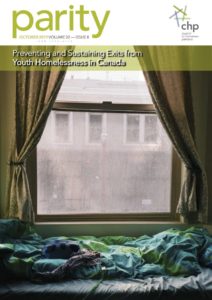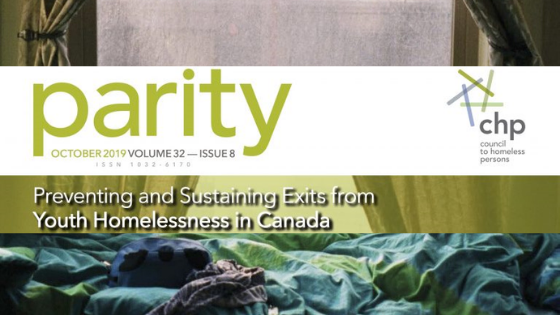
“While it takes a day to
fly there, from this end of the earth, we have much in common. Both societies were colonized by the British who put in place both
countries’ founding institutional
structures; and both nations
have First Peoples who suffered
immeasurably and on-goingly from that dispossession. Both Canada and Australia also share a growing problem of homelessness, fueled by the increasing cost of private rental housing, and an inadequate supply of social housing.” — Jenny Smith, CEO, Council to Homeless Persons (Australia).
In October 2019, the Australian Council to Homeless Persons partnered with The Canadian Observatory on Homelessness on a joint issue of Parity, Australia’s national homelessness magazine.
The publication is titled “Preventing and Sustaining Exits from Youth Homelessness in Canada”. In it, you can find some incredibly informative contributions examining solutions, preventative actions, and experiences of youth homelessness in a Canadian context.
We are proud to have an article about Zero Ceiling’s work and a showcase of our 12-month supportive housing and employment program, Work 2 Live, included in this issue.
Read the article in the October 2019 issue of Parity here: https://www.homelesshub.ca/sites/default/files/attachments/Parity-October2019-Vol32-08.pdf (Scroll down to page 68 of the PDF to read our article: “Why Whistler: A Ski Town’s 22-Year Journey to Combat Youth Homelessness”.)
One thing that becomes apparent as you read through the magazine is that the causes of youth homelessness are consistent across international borders. And so are the solutions.
As a society, we often discuss homelessness as an individual problem. However, through our experiences and research from sources like the Homeless Hub, we know that homelessness as a problem runs much deeper than on a personal level: it impacts our social networks, our communities, our countries, and eventually, the globe. Which is why the work we do is so important. And why the solutions must focus on more than the individual and address the systems and practices that stand in the way of ending youth homelessness.
What we wanted to capture in our article is that every community has the potential to create a better world by harnessing its unique resources and strengths to create positive change. We have witnessed this first-hand in our hometown of Whistler, an isolated mountain resort with about 12,000 residents and a housing problem. Where, nonetheless, Zero Ceiling has worked to end youth homelessness for nearly 23 years, and has hosted over 4,300 youth in need through our Adventure Sessions and Work 2 Live programs.
So, be proud, Whistler. We are far from perfect, but that doesn’t mean we can’t celebrate the good stuff.


